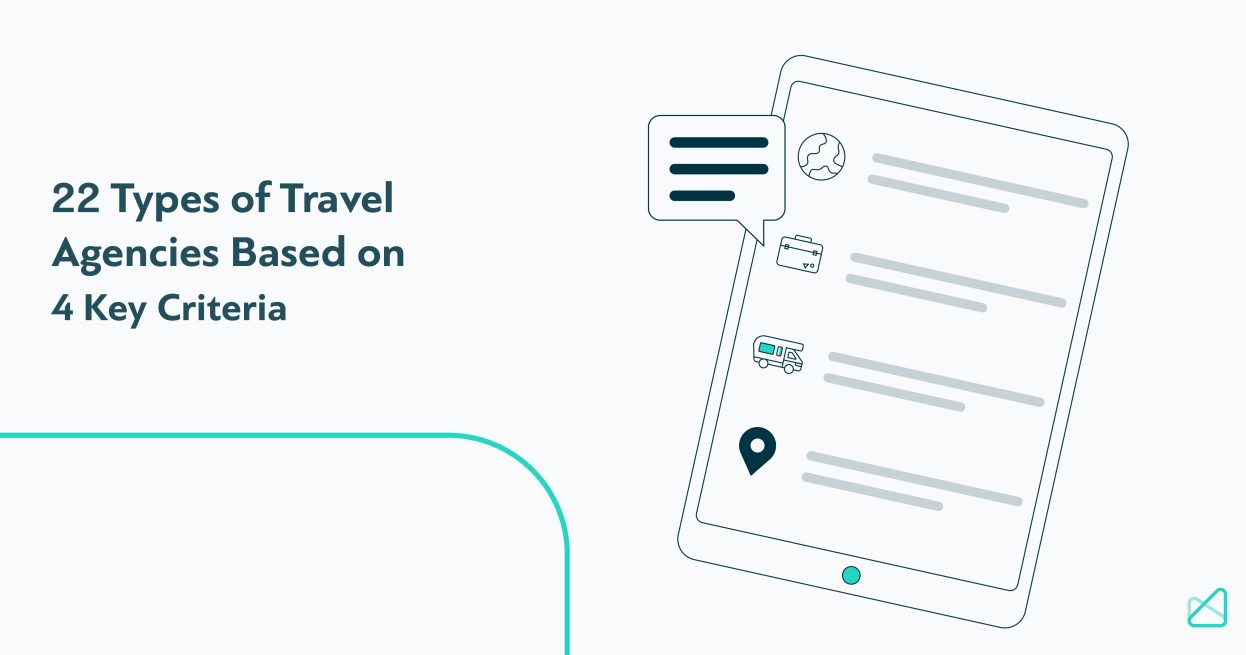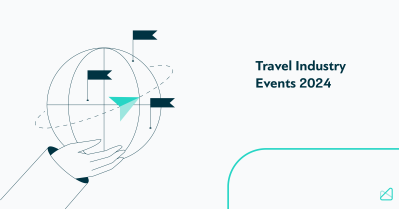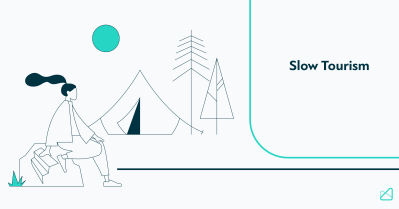22 Types of Travel Agencies Based on 4 Key Criteria

The best way to understand the intricate design of the tourism industry is to observe the businesses that operate within it. Travel agencies are the cogs that keep travel machinery moving forward. However, not all travel agencies operate in the same way. Plus, these businesses often tend to go through operational and managerial changes driven by technology implementations and shifts in the best practices.
If you are planning to work with or in an agency, you need to know more about travel agencies in general. Staying tuned to the latest developments can be challenging. That’s why we decided to help you answer the ultimate question – “How many types of travel agencies exist?”
Let’s start with the travel agency definition to lay a foundation for the information that’s to come.
Travel agency definition
The best way to understand a travel agency is to look at it as a private retailer. It is a business that specializes in selling travel products and services. At the core of travel agencies, we have a global distribution system (GDS). This commonly used agency software system plays a vital role in enabling agencies to check the availability and prices of accommodation and travel arrangements.
Two most commonly used travel agency definitions come from Airlines Reporting Corporation and SARC. The first one goes along the following lines:
“Travel agency is a business with the following functions: makes reservations, quotes fares, rates, arranges travel insurance, arranges travel tickets and accommodation, accepts payments, foreign currency, and documents.”
Here is the definition by SARC:
“Travel agency is a business that specializes in selling tourism products and tourism-related services to tourists and performs arranging transportation and accommodation, air ticket issuing, accepting payments, and providing additional specialized services.”
Travel agencies often work with vendors from whom they source travel products and enable direct, over-the-phone, or online booking for their customers. Their primary source of income comes from the commission rates the vendors give them. Without going into great detail, the commission rates are not uniform and depend on several factors. However, as you will see, some travel agencies act as intermediaries between vendors and other travel agencies. The primary source of income of these agencies is the services they provide to other agencies.
Travel agencies also differ in terms of the distribution channels they use. There are three main distribution channels available to travel agencies: online channels, strategic partnerships, and offline channels. To stay competitive, many agencies use more than one channel, often all three at the same time.
Now let’s see how many unique types of travel agencies are there.
How many types of travel agencies exist
There are dozens of types of travel agencies out there. The best way to understand each type is to have a classification system. That’s exactly what we decided to do.
Below you can find different types of travel agencies based on the business model, business size, services, geographical coverage, number of outlets, level of specialization, distribution chain, type of vacations they offer, agency functions, and tourism flows.
Let’s start with some of the most basic classifications, including business model and size.
🧑🏻🤝🧑🏿 Travel agency types based on the number of travelers
Travel products don’t only differ in terms of destination and available amenities in the location. Some travel agencies prefer catering to individual travel needs, while others facilitate group travel. There are, of course, those that offer individual and group travel arrangements. There are three travel agency types based on the number of travelers.
FIT travel agencies
FIT stands for “foreign independent travel” or, a more modern term, “flexible, independent travel.” This is the most common type of agency you can find both online and offline. While they offer regular products, they also include tailor-made travel experiences to accommodate travelers’ individual needs and interests. The examples include:
Group travel agencies
Group travel agencies, as the name suggests, specialize in group travel. They offer a number of group travel packages. The travel products they offer are often tailored for ten or more travelers. The agencies negotiate their travel products according to the size of the group. Some of them enable booking online. However, the majority offer services offline because some hotels tend to cancel the bookings if they detect a group. Here are a couple of examples:
FIT & Group travel agencies
FIT & Group travel agencies work with a wide range of travelers, including those who are interested in tailor-made experiences and those who prefer group travel. Their travel product portfolio is often quite big and diverse. The noteworthy examples include:
🛒 Travel agency types based on the type of market
The famous question from Hollywood movies: “Business or pleasure?” brings us to our next travel agency classification. All travel agencies can be divided into two groups based on whether they sell leisure or business travel packages.
Leisure travel agency
As its name implies, a leisure travel agency specializes in selling holidays and leisure trips. They cater to the needs of customers interested in having fun, rest, and relaxation. Their itineraries can also include various activities ranging from excursions to local sightseeing. Here is an example:
Business travel agency
Business travel agencies offer custom-tailored trip experiences to businesses. They help streamline sales presentations, conferences, and meetings, whether scheduled in a state or abroad. They cater to passengers traveling for working purposes and facilitate MICE and incentive travels. The two examples include:
🚛 Travel agency types based on the type of distribution
All travel agencies can be categorized into two big groups based on the type of distribution. There are those who source and cater their products toward businesses, so-called wholesalers, or B2B travel agencies. The other type of travel agency encompasses travel companies focused on B2C markets.
Wholesalers or B2B travel agencies
Wholesalers of B2B travel agencies distribute their products through other agencies. Their primary source of income is commission rates. They can either source products from other B2B travel agencies or create travel products of their own. There are several types of wholesalers depending on how they choose to do business.
Tour Operators
Tour operators are companies that specialize in creating complete travel products. Their products often include hotel rooms, transportation, and activities at the location, such as excursions. Tour operators exclusively distribute their products through agencies. Here are the examples:
Bedbanks
Bedbanks are companies that focus on distributing hotel inventory through different channels. However, over time their scope of services kept growing. Today, Bedbanks also offer transfers and various services in destinations. Here are a couple of examples so you better understand what Bedbanks are:
DMCs
DMC stands for a destination management company. As the name suggests, these are inbound travel companies. They create inbound travel products for specific destinations and distribute them across various B2B channels. The examples include:
Wholesalers
Wholesalers operate similarly to tour operators. However, they don’t create travel products themselves. Instead, they source products from multiple Bedbanks, tour operators, and DMCs, and distribute them through B2B channels, mainly travel agencies. The examples of wholesalers include:
Travel networks
Travel networks are quite specific travel agencies. Their primary focus is on creating big travel agencies and travel advisor networks. Once the network is up and running, these travel agencies will provide all types of travel products to their partners and affiliates under exclusive terms and conditions. The examples include:
Retail
Retail travel agencies are the newest addition to the big family of different agency types. It is a new way of B2B distribution generated by Bedbanks. The goal is to provide products and services directly to travel agencies without the need to be a travel network. Here are some examples:
Travel agencies or B2C travel agencies
Travel agencies or B2C travel agencies offer travel products and services directly to consumers. There are different travel agency types based on how they set up their business in terms of distribution channels, location, and dependency. Let’s see the most common types of B2C travel agencies.
OTA
OTA or an online travel agency is not every agency you can use to book travel packages online. These are big companies that sell directly to consumers. They offer a wide range of travel products, including hotels, air tickets, car rentals, tickets for shows, travel insurance, tours, and all kinds of land transportation. We are sure that you are familiar with the following two examples of OTAs:
Physical offline travel agency
Physical offline travel agencies offer their services in person to consumers. Due to the shift to the online business model, the number of physical offline travel agencies continues to decrease. These agencies are mainly focused on providing personalized travel experiences to consumers. They provide advice regarding the best location to visit according to the travelers’ unique needs and expectations. Their offer also includes tailor-made itineraries and excursions. The examples include:
Physical + online travel agency
Physical + online travel agency is a new type of business. These agencies offer most of their services online. However, they still have offices, so they can work with travelers in person, answer questions, or provide advice. The examples include:
Independent travel advisor
Independent travel advisors work as independent travel professionals. They don’t align with any particular company or work for one. Their number continues to increase worldwide, especially in the US market. Independent travel advisors provide personalized service to travelers. The examples include:
Implants
Implants are travel professionals located within another company that has significant travel requirements. They often have a desk or entire office setup so they can meet the company’s travel demands and provide better services. The most noteworthy implants include:
Direct travel agencies
Due to the harsh competition and volatile markets, some businesses in the travel industry decided to offer their travel products directly to consumers through B2C channels. Such is the case with many hotels and airlines. Here are a couple of examples:
- https://www.deltavacations.com/
- https://www.latamairlines.com/
- https://www.wyndhamdestinations.com/
- https://www.viajaconviaja.com/
🛎️ Travel agency types based on the type of services
Finally, we come to a more specific classification of travel agencies. If you take a look at travel agencies only taking into account the type of services they offer, you can see that there are a number of different companies. With this in mind, we give you travel agency types based on the type of services they offer.
Regular services
Most commonly, travel agencies are focused on selling pre-designed products and services. They can sell those products and services on a regular or more exclusive basis. Here are two examples of travel agencies that provide regular services:
Tailor-made
Tailor-made travel agencies develop specific itineraries travelers can’t find anywhere else. They often enable clients to create completely custom products and make their own itineraries. Tailor-made travel agencies are either contracting directly or via DMCs. The two examples include:
Niche travel companies
Niche travel companies are focused on very specific demographics. They tend to study the particular needs and expectations of consumers in a demographic segment and create itineraries and experiences that reflect those needs.
LGBT
LGBT travel agencies specialize in LGBT travel and tailor-made vacations. They carefully create travel experiences to only include supplies that welcome everyone. These agencies also offer advice and adhere to the highest travel quality standards. Here are two examples:
Students
There are also travel agencies that specialize in offering products tailored for students. They enable students and youth to experience the world. These agencies often offer exclusive travel deals emphasizing cheap hotels, tours, and flights. Here are two examples:
Seniors
Seniors have enough experience to know how to make the best use of the travel time. Travel agencies for seniors offer travel tours specifically tailored to the needs of seniors ensuring they are freed up of all their worries so they can enjoy the destination they choose. Here are some examples:
Backpackers
Travel agencies for backpackers offer tailor-made backpacking travel experiences to people who enjoy this particular way of experiencing destinations. The examples include:
Travel Adventure
Travel agencies can specialize in travel adventures as well. They carefully source their products to ensure they pack enough adrenaline and that “wow” factor so they can attract consumers who prefer their travel to resemble an adventure. Here are examples:
Ski
Ski travel agencies specialize in customizing ski and snowboard vacation travel packages. They are often focused on creating or sourcing packages in one specific location. The examples include:
Luxury
Luxury travel agencies specialize in offering exclusive destinations, hotels, and activities. Their focus is on a rich clientele that reflects their product portfolio. They often offer tailor-made holidays and have special honeymoon offers. Here are a couple of examples:
When it comes to the travel agency types based on the type of service they sell, there can be many unique variations.
Conclusion
Travel agencies can operate in many ways and play different roles in the distribution chain of travel products and services. To answer your initial question:
“How many types of travel agencies exist?” There are more than 25 unique travel agency types depending on the segmentation you choose.
However, it’s practically impossible for an agency to be of only one type. For instance, it can be an inbound, leisure, niche travel agency. Hopefully, our ultimate guide to travel agency types will help you better understand these companies in terms of how they operate and their role in the travel industry.
Subscribe to
our newsletter
Yay! You are now
subscribed to our
newsletter
Mize is the leading hotel booking optimization solution in the world. With over 170 partners using our fintech products, Mize creates new extra profit for the hotel booking industry using its fully automated proprietary technology and has generated hundreds of millions of dollars in revenue across its suite of products for its partners. Mize was founded in 2016 with its headquarters in Tel Aviv and offices worldwide.
Related Posts

30 Most Important Travel Industry Events for 2024
30 min. Social share: 2024 is packed with must-attend travel industry events. Stop by to discover all relevant events conveniently grouped by continents with listed dates, themes, and locations! Many travel industry experts believe that travel industry events play a pivotal role in shaping the future of the travel industry. Why is this so? It’s […]

Empowering Equality: Mize Leads the Way in Travel Technology
7 min. Are we all equal? Are we all equally represented in the business world? In some professional sectors, there might still be some under-representation of women, minorities, and the LGBTQIA+ community. The tech sphere is no different, but is the travel tech sector a spark of hope? As the business world becomes more diverse, […]

Slow Tourism Case Studies: Examples to Truly Understand Slow Tourism
14 min. The tourism industry is moving at an ever-accelerating pace. That’s because the tourism industry is perhaps one of the verticals that depend on the most factors. One of the main factors that affect it is social movements, given that tourism brands of all sizes always cater to the needs of consumers. One of […]